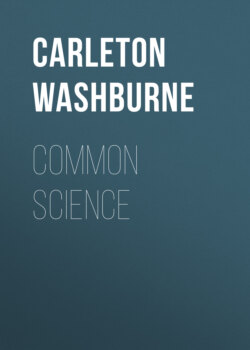Читать книгу Common Science - Carleton Washburne - Страница 36
На сайте Литреса книга снята с продажи.
Inference Exercise
ОглавлениеExplain the following:
51. Ink spilled on a plain board soaks in, but on a varnished desk it can be easily wiped off.
52. When a window is soiled you can write on it with your finger; then your finger becomes soiled.
53. A starched apron or shirt stays clean longer than an unstarched one.
54. When you hold a lump of sugar with one edge just touching the surface of a cup of coffee, the coffee runs up the lump.
55. A drop of water on a dry plate is not flat but rounded.
56. It is hard to write on cloth because the ink spreads out and blurs.
57. If you roughen your finger nails by cleaning them with a knife, they will get soiled much more quickly than if you keep them smooth by using an orange stick.
58. When you dip your pen in the ink and then move it across the paper, it makes ink marks on the paper.
59. If you suck the air out of a bottle, the bottle will stick to your tongue.
60. You cannot break a thick piece of iron with your hands.
Section 9. Friction.
What makes ice slippery?
How does a brake stop a car?
Why do things wear out?
It would not be such a calamity if we were to turn off friction from the world. Still, I doubt whether we should want to leave it off much longer than was necessary for us to see what would happen. Suppose we imagine the world with all friction removed:
A man on a bicycle can coast forever along level ground. Ships at sea can shut off steam and coast clear across the ocean. No machinery needs oiling. The clothes on your body feel smoother and softer than the finest silk. Perpetual motion is an established fact instead of an absolute impossibility; everything that is not going against gravity will keep right on moving forever or until it bumps into something else.
But, if there is no friction and you want to stop, you cannot. Suppose you are in an automobile when all friction stops. You speed along helplessly in the direction you are going. You cannot steer the machine—your hands would slip right around on the steering wheel, and even if you turn it by grasping the spoke, your machine still skids straight forward. If you start to go up a hill, you slow down, stop, and then before you can get out of the machine you start backward down the hill again and keep on going backward until you smash into something.
A person on foot does not fare much better. If he is walking at the time friction ceases, the ground is suddenly so slippery that he falls down and slides along on his back or stomach in the same direction he was walking, until he bumps into something big or starts to slip up a slope. If he reaches a slope, he, like the automobile, stops an instant a little way up, then starts sliding helplessly backward.
Another man is standing still when the friction is turned off. He cannot get anywhere. As soon as he starts to walk forward, his feet slip out from under him and he falls on his face. He lies in the same spot no matter how he wriggles and squirms. If he tries to push with his hands, they slip over the rough ground more easily than they now slip through air. He cannot push sideways enough even to turn over. If there happens to be a rope within reach and one end is tied to a tree, he might try to take hold of the rope to pull himself along. But no matter how tightly he squeezes, the rope slips right through his hands when he starts to pull. If, however, there is a loop in the rope, he can slip his hand through the loop and try to pull. But the knots with which the rope is tied immediately come untied and he is as helpless as ever.
Even if he takes hold of a board fence he is no more successful. The nails in the board slip out of their holes and he is left with a perfectly slippery and useless board on the ground beside him for a companion. As it grows cold toward evening he may take some matches out of his pocket and try to start a fire. Aside from the difficulty of his being unable to hold them except by the most careful balancing or by shutting them up within his slippery hands, he is entirely incapable of lighting them; they slip over the cement beneath him or over the sole of his shoe without the least rubbing.
In the real world, however, it is fortunately as impossible to get away from friction as it is to get away from the other laws we have tried to imagine as being turned off. There is always some friction, or rubbing, whenever anything moves. A bird rubs against the air, the point of a spinning top rubs against the sidewalk on which it is spinning. Your shoes rub against the ground as you walk and so make it possible for you to push yourself forward. The drive wheels of machinery rub against the belts and pull them along. There is friction between the wheels of a car and the track they are pushing against, or the wheels would whirl around and around uselessly.
